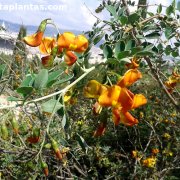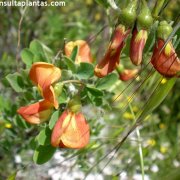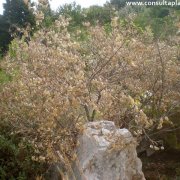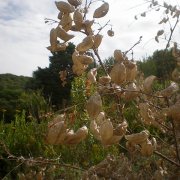Care of the shrub Colutea or Bladder Senna |
|
The genus Colutea, family Fabaceae, comprises 25 species of shrubs native to Asia and the Mediterranean region. Some species are: Colutea arborescens, Colutea orientalis, Colutea hispanica, Colutea melanocalyx. Common name: Bladder Senna. They are shrubs with fine branches that reach 3 meters (9.84 feet) in height. The leaves are pinnate, deciduous and alternate. The flowers (similar to those of the pea) appear in clusters and can be yellow, orange or bluish. They bloom in midsummer and produce highly decorative, reddish pod-shaped fruits. Bladder Senna is used as isolated specimens on the lawn or in small bushy groups. It can also be grown in pots at least 70 cm (2.29 feet) deep. Colutea needs full sun or semi-shade exposure. The ideal annual average temperature is 15-25 ºC (59-77 ºF); it resists occasional frosts. The soil can be a normal garden substrate, well drained and with organic matter. Planting can be done from fall to the following spring. Water moderately all year round (2 waterings per week), increasing watering a little in summer. Colutea is quite resistant to drought. Fertilize in autumn with manure and with mineral fertilizer once a month in spring and summer. Prune intensively in late winter to strengthen the plant. Colutea is a plant that is quite resistant to pests and diseases that can be attacked by mites and aphids if the drought lasts excessively. Bladder Senna propagates by seeds sown in spring or by cuttings. |
Images of the shrub Colutea or Bladder Senna |
Find plants
Colutea or Bladder Senna | Care and Growing
© 2026 FavThemes



